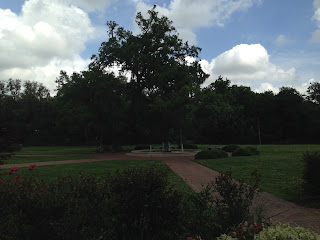My gracious hosts in New Orleans were nice enough to indulge my inner garden nerd yet again and took me to the
New Orleans Botanical Garden in City Park.
City Park has been around since 1854, making it one of the nation's oldest urban parks and the botanical garden has been open since the 1930's.
 |
| The main building with oaks. |
 |
| View to the Conservatory of the Two Sisters |
As kids (Alison and Alan) spent a lot of time in City Park, especially the adjacent
Storyland.
Storyland is a nursery rhyme/fairy tale themed park for little kids with
slides and other amusements. Its where parents take little kids in hopes they will play themselves into a coma. It's a little trippy to visit as an adult with no kids.
 |
| Entrance to Storyland |
In 2005, Hurricane Katrina devastated City Park, leaving 95% of the park
under one to eight feet of water for weeks. The park has since been
brought back to life largely through public support in volunteers and
donations. The botanical garden reopened March 4th, 2006.
This 1,300 acre botanical garden contains more than 2,000 plants, many native to Louisiana - think
magnolias, oaks, swamp iris.
There are a variety of garden types here to see. I may be a little out of order with my pictures and exactly which garden they belong to, but you'll get the idea.
The Zemurray Azalea and Camellia Garden is a formal garden with a manicured lawn and azaleas, rhododendrons and magnolias. We were a little late in the season to see the azaleas blooming.
 |
| Oak with Spanish moss. |
 |
| Iris 'Willa Mae' |
 |
| Iris 'Laura Louise' |
The Conservatory of Two Sisters has a small rainforest collection in the right wing as well as a Living Fossils garden in the left wing. The Living Fossil exhibit includes a variety of prehistoric plants like ferns, cycads and mosses.
 |
| View to the Conservatory of the Two Sisters. |
 |
| A lovely Bottlebrush. |
 |
| Entering the rainforest. |
 |
| Iwanagara 'Appleblossom'? |
 |
| Cochliostema odoratissimum |
 |
| The Living Fossils - There is an Alligator Gar in the pond! |
 |
| Pyrrosia hastata (Felt Fern) |
 |
| Aglaomorpha coronans (Santa Rosa Fern) |
There is a Butterfly & Hummingbird Garden planted with plants that support butterflies well as plant hosts for caterpillars.The hummingbirds get to enjoy nearby nectar producing flowers.
The Yakumo Nihon Teien Japanese Garden is small but quaint. It's easy to miss too if you don't notice the entrance while wondering around.
 |
| 八云日本庭园 (Eight Cloud Japanese Garden) |
The Stove House was a hot house packed to the gills with cactus and succulents. It was
also teaming with little local reptiles just hanging out amongst the
plants in the sunny warmth. I will cover this in another separate post as there were so many nice specimens to see.
 |
| An Agave in front of The Stove House |
 |
| I would be happy to take all this home! |
 |
| Euphorbia decaryi |
 |
| Gasteria armstrongii |
 |
| Adenium obesa |
 |
| Hello little friend! |
Edible Garden filled with vegetables and herbs. There was a quaint little pavilion to hide from the sun in and have a rest.
 |
| A sugar kettle water garden. |
The is a formal Rose Garden. However roses don't like the heat and humidity of New Orleans and require a lot of care and have to be replaced every few years.
The Lily Pond has a variety of hardy and tropical water lilies and a lovely statue of a girl riding a fish . Adjacent to the ponds are beds of roses.
The Southern Shade Garden was an area of tree ferns, hydrangeas, azaleas, caladiums, aroids and varieties of Japanese maples.
 |
| Voodoo lilies |
 |
| Rumohra adiantiformis (Leather Leaf Fern) |
The New Orleans Historic Train Garden is a model train area laided out to approximate the city. There are miniature buildings that represent typical house styles of New Orleans.
If you have a chance, please check out this jewel in City Park.
































































